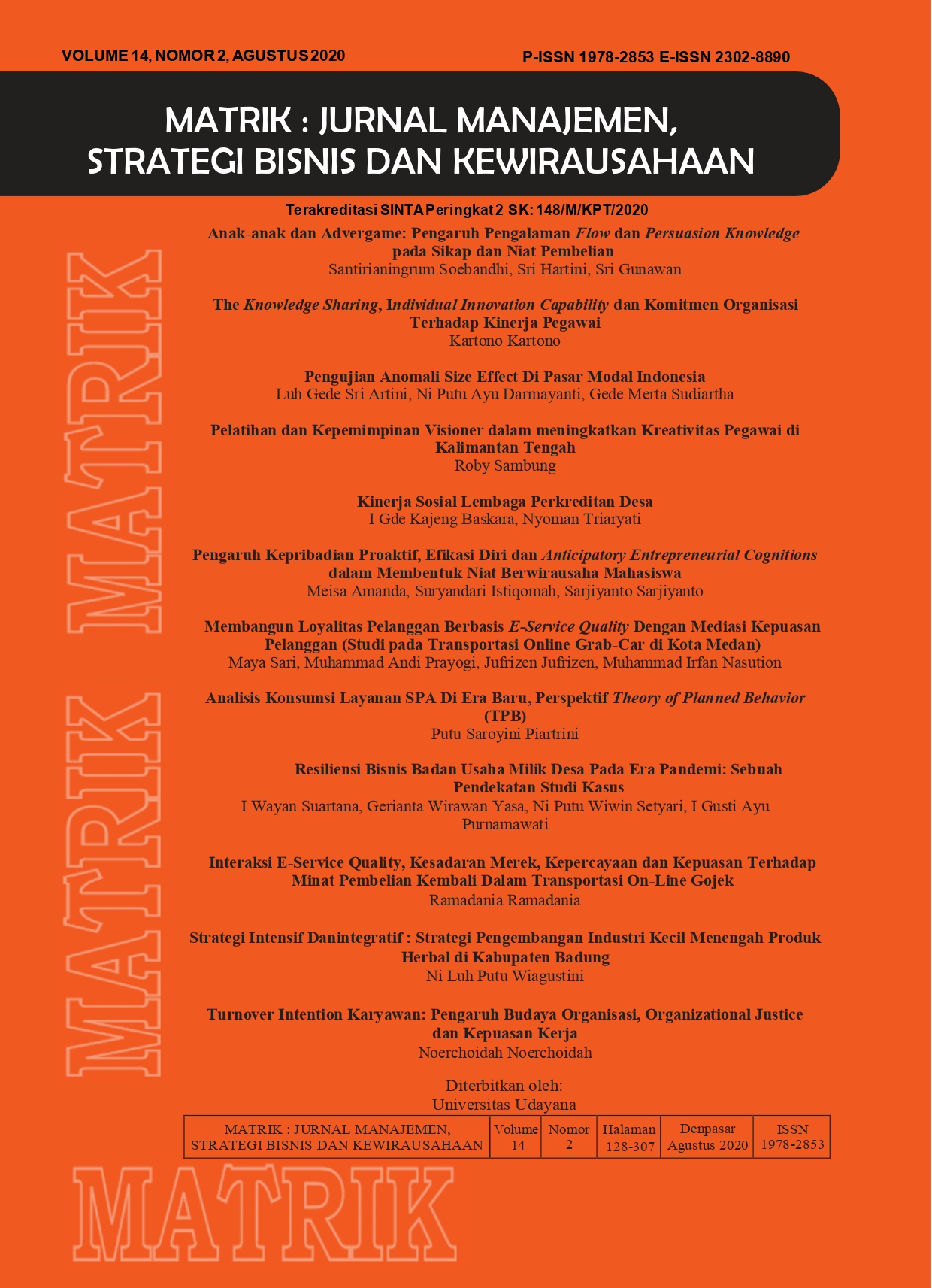Turnover Intention Karyawan: Pengaruh Budaya Organisasi, Organizational Justice dan Kepuasan Kerja
Abstract
The purpose of this study is to analyze the application of the concept of turnover intention to hotel employees in Surabaya-Indonesia, with a focus on the role of the construct of job satisfaction as a mediating variable. This research also aims to analyze the influence of organizational culture variables and organizational justice on job satisfaction, and to analyze the effect of job satisfaction on turnover intention. This research was conducted on 152 hotel employees in Surabaya with purposive sampling. The results of distributing questionnaires were processed using Partial Least Square (PLS) analysis techniques. There are 7 hypotheses proposed in this study, 6 hypotheses are supported, namely H1, H2, H4, H5, H6, and H7. While H3 is not supported. The results of this study support social exchange theory. The holistic conclusion of this study is that this research model is supported empirically.
Downloads
References
Abekah-Nkrumah, G., & Atinga, R. A. (2013). Exploring the link between organisational justice and job satisfaction and performance in Ghanaian hospitals: Do demographic factors play a mediating role? International Journal of Workplace Health Management, 6(3), 189–204. https://doi.org/10.1108/IJWHM-04-2011-0011
Abela, F., & Debono, M. (2019). The Relationship Between Psychological Contract Breach and Job-Related Attitudes Within a Manufacturing Plant. SAGE Open, 9(1). https://doi.org/10.1177/2158244018822179
Adams, J. S. (1965). Inequity in social exchange. Behavioral Research Service General Electric Company Crotonville, New York.
Arif, S. (2018). Impact of Organizational Justice on Turnover Intentions: Moderating role of Job Embededdness. SEISENSE Journal of Management, 1(2), 1–19. https://doi.org/10.5281/zenodo
Barakat, S. R., Isabella, G., & Boaventura, João Maurício Gama Mazzon, A. J. (2016). The influence of corporate social responsibility on employee satisfaction. Management Decision, 54(9), 2325–2339. https://doi.org/https://doi.org/10.1108/MD-05-2016-0308
Belias, D., Koustelios, A., Vairaktarakis, G., & Sdrolias, L. (2015). Organizational Culture and Job Satisfaction of Greek Banking Institutions. Procedia - Social and Behavioral Sciences, 175, 314–323. https://doi.org/10.1016/j.sbspro.2015.01.1206
Bernerth, J., & Walker, H. J. (2012). Reexamining the Workplace Justice to Outcome Relationship: Does Frame of Reference Matter? Journal of Management Studies, 49(5), 945–969. https://doi.org/10.1111/j.1467-6486.2010.00977.x
Blau. (1964). Exchange and Power in Social Life. New York: Wiley.
Bosomtwe, T. E., & Obeng, B. (2018). The Link between Organizational Culture and Turnover Intention among Employees in Ghana. International Journal of Contemporary Research and Review, 9(08), 20951–20958. https://doi.org/10.15520/ijcrr/2018/9/08/566
Cui, X., & Hu, J. (2012). A Literature Review on Organization Culture and Corporate Performance. International Journal of Business Administration, 3(2), 28–37. https://doi.org/10.5430/ijba.v3n2p28
Dess, G. G., & Shaw, J. D. (2001). Voluntary turnover, social capital, and organizational performance. Academy of Management Review, 26(3), 446–456. https://doi.org/10.5465/AMR.2001.4845830
Dwivedi, S., Kaushik, S., & Luxmi. (2013). Impact of Organizational Culture on Turnover Intentions in BPO Sector in India. Indian Journal of Industrial Relations, 48(4), 679–691. https://doi.org/http://www.jstor.org/stable/23509823
Egan, T. M., Yang, B., & Bartlett, K. R. (2004). The Effects of Organizational Learning Culture and Job Satisfaction on Motivation to Transfer Learning and Turnover Intention, 15(3), 279–301. https://doi.org/10.1002/hrdq.1104
Emami, R., Moradi, E., Idrus, D., & Almutairi, D. O. (2012). Investigating the Relationship between Organizational Learning Culture , Job Satisfaction and Turnover Intention in it SMEs, 12(April), 8–23. Retrieved from https://www.academia.edu/1538753/Investigating_the_Relationship_between_Organizational_Learning_Culture_Job_Satisfaction_and_Turnover_Intention_in_it_SMEs
Foley. (1996). US Lodging Industry: The Next Ten Years. Presentation at the Long Range Planning Committee Meeting of the Educational Institute of the American Hotel and Motel Association.
Ghozali, I. (2014). Structural Equation Modeling, Metode Alternatif dengan Partial Least Square (PLS) (4th ed.). Semarang : Badan Penerbit Universitas Diponegoro.
Hasan Ali Al-Zu’bi. (2010). A Study of Relationship between Organizational Justice and Job Satisfaction. International Journal of Business and Management, 5(12), 102–109. https://doi.org/10.5539/ijbm.v5n12p102
Henry Syauta, J., Afnan Troena, E., & Setiawan, M. (2012). The Influence of Organizational Culture, Organizational Commitment to Job Satisfaction and Employee Performance (Study at Municipal Waterworks of Jayapura, Papua Indonesia). International Journal of Business and Management Invention ISSN (Online, 1(1), 2319–8028. Retrieved from www.ijbmi.org
Idiegbeyan-Ose, J., Opeke, R., Nwokeoma, N. M., & Osinulu, I. (2018). Influence of organisational culture on turnover intention of library staff in Private University Libraries, South-West Nigeria. Academy of Strategic Management Journal, 17(4), 1–13.
Imran, R. (2015). Impact of Organizational Justice, Job Security and Job satisfaction on Organizational Productivity. Journal of Economics, Business and Management, 3(9). https://doi.org/10.7763/joebm.2015.v3.295
Jacobs, E. J., & Roodt, G. (2011). The mediating effect of knowledge sharing between organisational culture and turnover intentions of professional nurses. SA Journal of Information Management, 13(1), 1–6. https://doi.org/10.4102/sajim.v13i1.425
Karkoulian, S., Assaker, G., & Hallak, R. (2016). An empirical study of 360-degree feedback, organizational justice, and firm sustainability. Journal of Business Research, 69(5), 1862–1867. https://doi.org/10.1016/j.jbusres.2015.10.070
Kaur Sahi Mahajan. (2014). Employees Of Organisational Commitment and Teh Impact On Turnover Intentions. Asia Pacific Journal Marketing Logistics, 26(4), 621–646. https://doi.org/https://doi.org/10.1108/APJML-01-2014-0015
Kessler, L. L. (2014). The Effect of Organizational Culture on It Employees Turnover. Annals of the University of Oradea: Economic Science, 23(1), 1019–1027. Retrieved from https://doaj.org/article/f45c285185f74b418334f8896ca142bf
Koslowsky, M., Weisberg, J., Yaniv, E., & Zaitman-Speiser, I. (2012). Ease of movement and sector affiliation as moderators of the organizational and career commitment: Turnover intentions link. International Journal of Manpower, 33(7), 822–839. https://doi.org/10.1108/01437721211268348
Kuntardina, A. (2017). Nurses and Staff Turnover Intentions in Private Hospitals, 131, 98–103. https://doi.org/10.2991/icoi-17.2017.17
Kwon Choi, B., Koo Moon, H., Ko, W., & Min Kim, K. (2014). A cross-sectional study of the relationships between organizational justices and OCB. Leadership & Organization Development Journal, 35(6), 530–554. https://doi.org/10.1108/lodj-08-2012-0103
MacIntosh, E. W., & Doherty, A. (2010). The influence of organizational culture on job satisfaction and intention to leave. Sport Management Review, 13, 106–117. https://doi.org/10.1016/j.smr.2009.04.006
Mansor, M., & Tayib, M. (2010). An Empirical Examination of Organisational Culture, Job Stress and Job Satisfaction within the Indirect Tax Administration in Malaysia. International Journal of Business and Social Science, 1(1), 81–95. Retrieved from http://ssrn.com/abstract=1713048
Mbah, S. E., & Ikemefuna, C. O. (2012). Job Satisfaction and Employee s ’ Turnover Intentions in total Nigeria plc . in Lagos State. International Journal of Humanities and Social Science, 2(14), 275–287.
Mohamed, A., Shurbagi, A., & Zahari, I. Bin. (2012). The Relationship between Organizational Culture and Job Satisfaction in National Oil Corporation of Libya. Iternational Journal of Humanities and Applied Sciences, 1(3), 88–93.
Mok, C., & Luk, Y. (1995). Exit interviews in hotels: making them a more powerful management tool. International Journal Hospitality Management, 14(2), 187–194. https://doi.org/https://doi.org/10.1016/0278-4319(95)00025-8
Nadiri, H., & Tanova, C. (2010). An investigation of the role of justice in turnover intentions, job satisfaction, and organizational citizenship behavior in hospitality industry. International Journal of Hospitality Management, 29(1), 33–41. https://doi.org/10.1016/j.ijhm.2009.05.001
Noerchoidah, Eliyana, A., & Christiananta, B. (2020). Enhanching Innovative Work Behavior in the Hospitality Industry: Empirical Research from East Java, Indonesia. International Journal of Business and Society, 21(1), 96–110. http://www.ijbs.unimas.my/images/repository/pdf/Vol21-no1-paper6.pdf.
Noerchoidah, & Harryono, S. (2019). The Influence Analysis of Organizational Culture and Motivation of The Caddy Work Satisfaction In A. Yani Golf Surabaya. Journal of Economic, Accounting and Management Science, 1(1), 38–45. https://doi.org/http://jeams.id/index.php/jeams/article/view/4
Park, J. S., & Kim, T. H. (2009). Do types of organizational culture matter in nurse job satisfaction and turnover intention? Leadership in Health Services, 22(1), 20–38. https://doi.org/10.1108/17511870910928001
Parker, R. J., & Kohlmeyer, J. M. (2005). Organizational justice and turnover in public accounting firms: A research note. Accounting, Organizations and Society, 30(4), 357–369. https://doi.org/10.1016/j.aos.2004.05.001
Regts, G., & Molleman, E. (2013). To leave or not to leave: When receiving interpersonal citizenship behavior influences an employee’s turnover intention. Human Relations, 66(2), 193–218. https://doi.org/10.1177/0018726712454311
Richardson, H. A., Yang, J., Vandenberg, R. J., DeJoy, D. M., & Wilson, M. G. (2008). Perceived organizational support’s role in stressor-strain relationships. Journal of Managerial Psychology, 23(7), 789–810. https://doi.org/10.1108/02683940810896349
Robbin & Judge. (2019). Organizational Bahavior (16th ed.). Jakarta: Salemba Empat.
Suifan, T. S., Diab, H., & Abdallah, A. B. (2017). Does organizational justice affect turnover-intention in a developing country? The mediating role of job satisfaction and organizational commitment, 36(9), 1137–1148. https://doi.org/10.1108/JMD-02-2017-0048
Suifan, T. S. (2019). The Effect of Organizational Justice on Employees’ Affective Commitment The Mediating Role of Job Satisfaction, 13(2). https://doi.org/10.5539/mas.v13n2p42
Tumbelaka, S. S. X., Habsji, T. Al, & Nimran, U. (2016). Pengaruh Budaya Organisasi Terhadap Kepuasan Kerja, Komitmen organisasional dan Intention to Leave (Studi pada Karyawan PT.Bitung Mina Utama). Jurnal Bisnis Dan Manajemen, 3(1), 94–108. https://doi.org/http://jurnal.unmer.ac.id/index.php/jbm/article/view/78/19
Tzeng, H. M. (2002). The influence of nurses’ working motivation and job satisfaction on intention to quit: An empirical investigation in Taiwan. International Journal of Nursing Studies, 39(8), 867–878. https://doi.org/10.1016/S0020-7489(02)00027-5
Wang, X., Liao, J., Xia, D., & Chang, T. (2010). The impact of organizational justice on work performance: Mediating effects of organizational commitment and leader-member exchange. International Journal of Manpower, 31(6), 660–677. https://doi.org/10.1108/01437721011073364
Wijaya, A. (2019). Metode Penelitian Menggunakan SMART PLS 03.
Yean, T. F., & Yusof, A. A. (2016). Organizational Justice: A Conceptual Discussion. Procedia - Social and Behavioral Sciences, 219, 798–803. https://doi.org/10.1016/j.sbspro.2016.05.082
Yeun, Y. R., & Han, J. W. (2016). Effect of nurses’ organizational culture, workplace bullying and work burnout on turnover intention. International Journal of Bio-Science and Bio-Technology, 8(1), 372–380. https://doi.org/10.14257/ijbsbt.2016.8.1.33
Zhang, Y., Lepine, J. A., Buckman, B. R., & Wei, F. (2014). It’s not fair⋯ or is it? The role of justice and leadership in explaining work stressor-job performance relationships. Academy of Management Journal, 57(3), 675–697. https://doi.org/10.5465/amj.2011.1110
 This work is licensed under a Creative Commons Attribution-ShareAlike 4.0 International License.
This work is licensed under a Creative Commons Attribution-ShareAlike 4.0 International License.

















